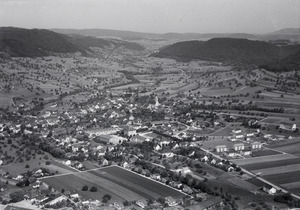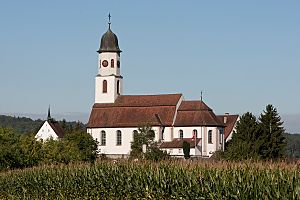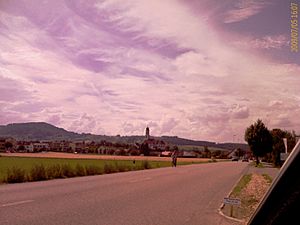Frick, Aargau facts for kids
Quick facts for kids
Frick
|
||
|---|---|---|
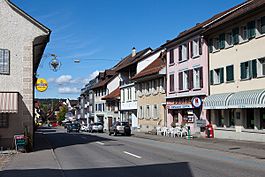 |
||
|
||
| Country | Switzerland | |
| Canton | Aargau | |
| District | Laufenburg | |
| Area | ||
| • Total | 9.96 km2 (3.85 sq mi) | |
| Elevation | 350 m (1,150 ft) | |
| Population
(Dec 2020 )
|
||
| • Total | 5,629 | |
| • Density | 565.2/km2 (1,463.8/sq mi) | |
| Postal code |
5070
|
|
| Surrounded by | Eiken, Gipf-Oberfrick, Hornussen, Ittenthal, Kaisten, Oeschgen, Schupfart, Ueken | |
| Twin towns | Frickingen (Germany) | |
Frick is a town in Switzerland. It is a municipality in the Laufenburg district, located in the canton of Aargau.
Contents
History of Frick
Long ago, in the prehistoric times, people lived near Frick. A very old fort from the Late Bronze Age was found on the Wittnauer Horn hill.
Later, around the 2nd century, the Romans built a large house, called a villa, where Frick is today. In the early 4th century, they built a small fort. This fort helped protect a military road that went from Vindonissa to Augusta Raurica.
After the Romans, a group of people called the Alemanni settled here between the 6th and 9th centuries. They built a church with strong walls. You can still see parts of its old foundations near the church that stands there now.
The name "Frick" comes from the region called Frickgau. This name likely came from a Latin word meaning "iron mine." This is because there was an iron mine here during the Roman times.
During the High Middle Ages, the area of Frickgau was owned by powerful families, like the Counts of Homberg-Thierstein. Later, around 1230, it became part of the lands controlled by the House of Habsburg.
The town of Frick was part of a special area called a bailiwick. This area had its own rules and even the right to choose its local leader, called a reeve.
In 1803, Frick and the surrounding area became part of the new Canton of Aargau. The towns of Frick and Gipf-Frick were officially formed in 1804.
A very exciting discovery happened in Frick in 2007. A huge dinosaur graveyard was found! Many bones, including a complete skeleton of a Plateosaurus, are now on display at the Sauriermuseum (Dinosaur Museum) in Frick.
The Church of St. Peter and Paul was probably built by the Counts of Homberg in the Middle Ages. The village and church were destroyed during the Thirty Years War. The church you see today was built in 1716. There is also a Reformed church from 1910.
The town's official symbol, its coat of arms, shows a red wolf on a white background. This symbol was chosen in 1931. Before that, Frick used the symbol of the wider Fricktal region, which was a green linden leaf.
Geography of Frick
Frick covers an area of about 9.96 square kilometers (3.85 square miles). A large part of this land, about 46%, is used for farming. Forests cover about 29% of the area. The rest, about 24%, has buildings, roads, and other developed areas.
Over the last few decades, the amount of land with buildings has grown. The amount of land used for farming has become a little smaller.
Frick is located where three mountain passes meet: Bözberg, Staffelegg, and Benken. These passes are in the Jura Mountains. Frick is a central town in the Fricktal region. The town itself is a haufendorf village. This means it's an old village that grew without a strict plan, with buildings packed closely around a central area.
Dinosaurs of Frick
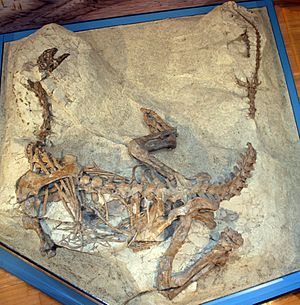
About 210 million years ago, during the upper Triassic period, the area around Frick was a dry, flat land with small hills. When it rained, water would collect in low areas, and dinosaurs would gather around these ponds.
When dinosaurs died, their bodies would sink into the mud in these ponds. Over millions of years, their bones turned into fossils. This is why Frick has so many dinosaur fossils!
The first Plateosaurus fossils were found here in 1961. Since then, many more fossils have been discovered. In 2006, a small meat-eating dinosaur fossil, called a coelophysoidean, was found by someone who loved looking for fossils. In 2019, this dinosaur was named Notatesseraeraptor. You can see many of these amazing fossils at the Sauriermuseum in Frick.
People of Frick
Frick has a population of about 5,284 people (as of 2015). About 24.5% of the people living in Frick are from other countries.
Most people in Frick speak German, which is about 85% of the population. Italian is the second most common language, and Albanian is the third.
Children and teenagers (up to 19 years old) make up about 20.7% of the population. Adults (20 to 64 years old) are the largest group, at 63.1%. Seniors (over 64 years old) make up about 16.1% of the population.
The number of people living in Frick has changed over time:

Important Buildings and Sites
The Catholic church of St. Peter and Paul is a very important historical building. It is listed as a heritage site of national significance in Switzerland. The entire village of Frick is also recognized as an important Swiss heritage site.
Transportation in Frick
Frick is easy to reach because it is located right on the A3 motorway. There is also a train station in Frick, which is served by the Swiss Federal Railways. This makes it easy for people to travel to and from Frick by car or train.
Economy and Jobs
In 2014, there were about 3,540 people working in Frick. Many different types of businesses operate here.
- Farming: A small number of people work in farming, like growing crops or raising animals.
- Industry: Many people work in factories and workshops, making things.
- Services: The largest number of jobs are in the service sector. This includes jobs in shops, offices, schools, and other services.
In 2015, Frick even had a movie theater with 177 seats!
Many people who live in Frick also work in other towns. At the same time, many people from other towns come to Frick for work. About 18% of workers use public transportation, like trains or buses, to get to work. About 40% use their own cars.
Religion
Based on information from 2000, about 51.2% of the people in Frick are Roman Catholic. About 23.1% belong to the Swiss Reformed Church. A small number of people also belong to the Christian Catholic faith.
Education in Frick
Frick has good schools. About 66.6% of adults (aged 25–64) have completed higher education, like university or a specialized college.
In the 2008/2009 school year:
- 318 students attended primary school.
- 246 students attended secondary school.
- 402 students were studying at a university or college level in the municipality.
See also
 In Spanish: Frick para niños
In Spanish: Frick para niños
 | Delilah Pierce |
 | Gordon Parks |
 | Augusta Savage |
 | Charles Ethan Porter |





